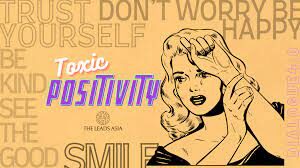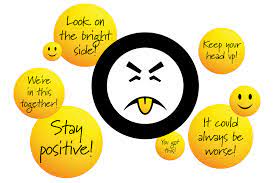“Often my response to, how are you is, I am Ok.” Instantly, the response I receive is “why only ok”? Or “you should say I am awesome” or “why are you being so negative”.
In these challenging times, with economic recession and widespread social unrest, it’s not uncommon to come across phrases meant to offer comfort and reassurance. However, as well-intentioned as they may be, experts warn against relying too heavily on these “good vibes only” messages. This excessive positivity can be toxic, as it downplays the importance of negative emotions and experiences. #emotionalintelligence
Toxic positivity is the idea that the best way to deal with difficult situations is to put a positive spin on them and avoid dwelling on the negative. This can prevent individuals from fully coping and healthily processing their emotions. Wanting to feel happy all the time can lead to a “secondary emotion” which is an emotion about an emotion. It can also be referred to as “overlay emotion” or “shadow emotion”. This secondary emotion is often disappointment, as people may feel like they are not as happy as they want to be. This accumulation of negative emotions can damage mental health over time. It’s like having “too much chocolate” – it may make us feel better temporarily, but it can ultimately make us sick.
During this era, where anxiety and depression have reached historic levels, toxic positivity can only worsen the situation by preventing people from addressing the serious issues they may be facing. It’s important to remember that it’s okay to not be okay and to allow ourselves to feel and process our emotions. Being gentle and compassionate with ourselves and others during these challenging times is essential. #emotionalintelligence
While it may seem counterintuitive, embracing and processing negative emotions can be beneficial for mental health. Ignoring or invalidating negative emotions can lead to bottling them up, which can lead to a buildup of emotional tension and can manifest into physical and mental health issues. Negative emotions such as sadness, anger, and frustration are a natural part of the human experience and they serve a purpose. They can help us to identify and address problems, and make positive changes in our lives.
Instead of focusing on toxic positivity, it’s important to allow ourselves to feel and process our emotions healthily. This can include talking about our feelings with a trusted friend, journaling, or engaging in self-care activities such as exercise, sports, or meditation.
To shield yourself from toxic positivity, it is important to exercise critical thinking skills, a key skill within the realm of #emotionalintelligence. This can include evaluating the media representation of how people are coping with issues against their reality. By recognizing that you are not alone in your concerns, doubts or lack of motivation, you can reduce the impact of unrealistic expectations that are promoted.
Being aware of ourselves and how we interact with the world is an important aspect of being healthy. If you find yourself spreading toxic positivity, it’s important to stop. This kind of thinking is harmful not only to yourself but also to the people around you. Instead of promoting toxic positivity, strive for balance and the acceptance of both positive and negative emotions. Avoid all-or-nothing thinking.
If you find yourself on the receiving end of toxic positivity, it’s important to set healthy boundaries with those who pass judgment on your emotions and feelings. Speak your truth and don’t let anyone invalidate your experiences. Life is a beautiful, painful, and imperfect journey, and it’s important to embrace it fully. Do it and you will find yourself being able to experience life in its entirety and reap the rewards of living fully.
Image Courtesy:Ed Week.org


